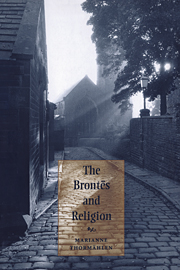Book contents
- Frontmatter
- Contents
- Acknowledgements
- Abbreviations and editions
- Introduction
- I Denominations
- II Doctrines
- Chapter 4 The Brontës in the theological landscape of their time
- Chapter 5 God and his creation
- Chapter 6 Faith and redemption
- Chapter 7 This life and the next
- III Ethics
- IV Clerics
- Notes
- Select bibliography
- Index
Chapter 4 - The Brontës in the theological landscape of their time
Published online by Cambridge University Press: 22 September 2009
- Frontmatter
- Contents
- Acknowledgements
- Abbreviations and editions
- Introduction
- I Denominations
- II Doctrines
- Chapter 4 The Brontës in the theological landscape of their time
- Chapter 5 God and his creation
- Chapter 6 Faith and redemption
- Chapter 7 This life and the next
- III Ethics
- IV Clerics
- Notes
- Select bibliography
- Index
Summary
The preceding section looked at the religious development of the Brontës in the context of those denominational differences and dissensions that prevailed in the Britain of their youth and brief maturity. They were obviously well acquainted with the questions involved, and the topography of the respective camps was familiar to them. In view of Charlotte Brontë's ardent and idealistic personality, it would have been natural to expect her to take up arms under the banner of the combatant with the greatest claim on her loyalties; but her dedication to truth made adherence to a party impossible and caused her to move freely on territories far away from the heartland of Anglican orthodoxy. Tough-minded, intelligent Anne's temperament was of a quieter cast, but her explorations of vexed religious issues were every bit as daring as her sister's. Emily's robust unconcern with dogma may seem to represent an extreme position even in this spiritually libertarian family; but her sisters will have found Lockwood's characteristically pusillanimous refusal to engage with Nelly Dean's ‘something heterodox’ question about the degree of happiness enjoyed by the likes of Catherine Earnshaw Linton in ‘the other world’ as ridiculous as she (II.ii.165). The Brontës resembled some of the leading religious thinkers of their time, notably Thomas Erskine and F. D. Maurice, in regarding religion as the concern of the individual soul guided by God.
- Type
- Chapter
- Information
- The Brontës and Religion , pp. 47 - 52Publisher: Cambridge University PressPrint publication year: 1999



